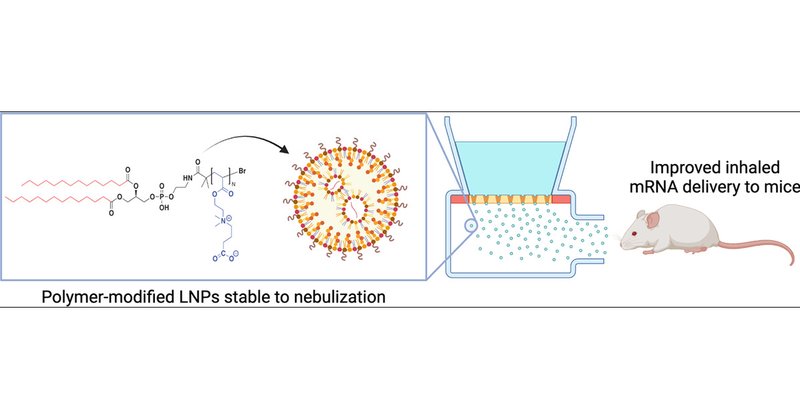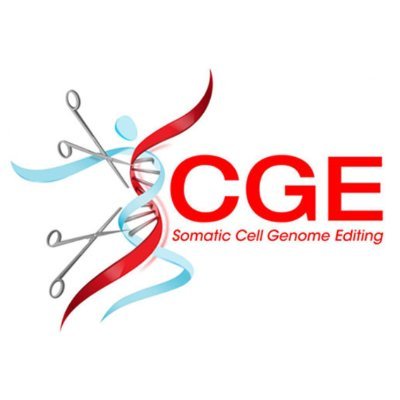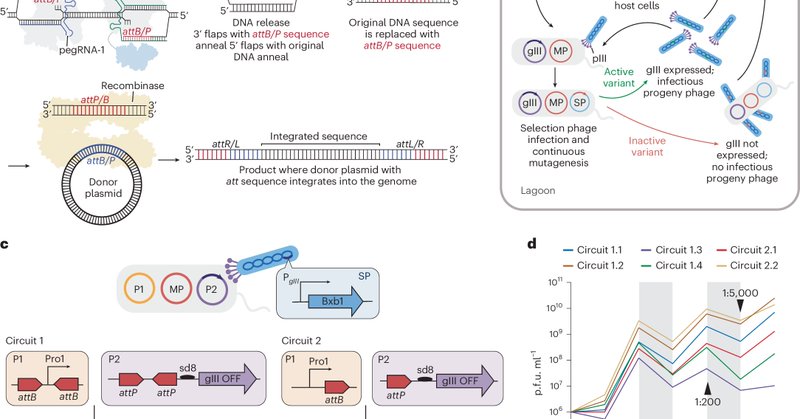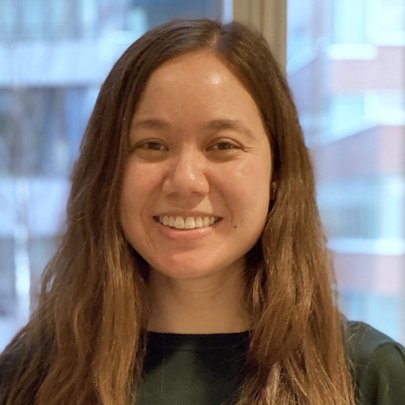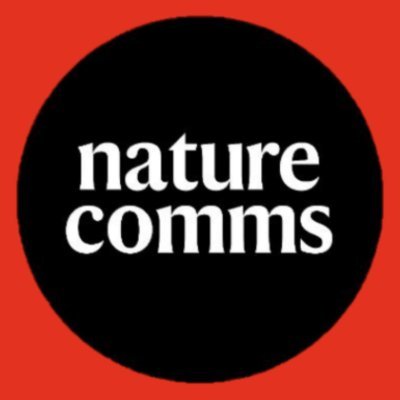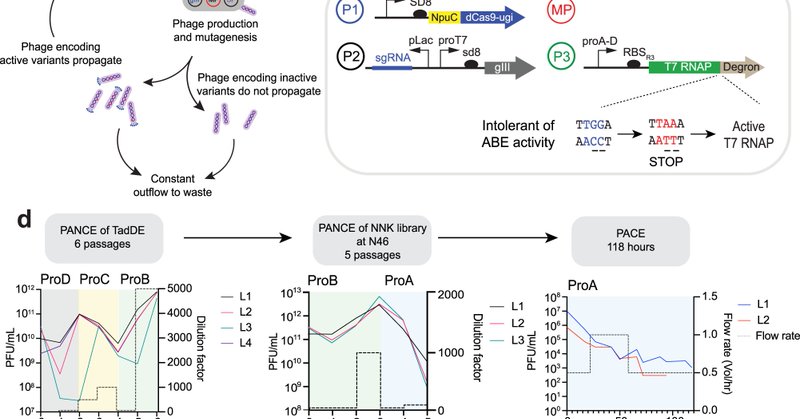
Emily Zhang
@emilyzhang326
Followers
134
Following
127
Media
0
Statuses
26
PhD candidate @HarvardCCB & @BroadInstitute | genome editing @liugroup | previously @UCB_Chemistry
Cambridge, MA
Joined November 2022
I’m thrilled to share the results from the first project of my PhD! Huge thanks to my co-authors @NeugMonicaElena and @NicholasKrasnow for their contributions and support throughout the project. Very excited to see how the community will use these next-generation base editors!
Today we report in @NatureComms the development of laboratory-evolved CBE6 cytosine base editors that offer high on-target C•G-to-T•A editing, virtually no A•T-to-G•C editing, low off-target editing, broad sequence context compatibility, and compatibility with multiple Cas
6
9
118
Honored to have contributed my part to the next step towards disease-agnostic genome editing! Congratulations team ❤️
Today in @Nature we report a new prime editing strategy that can rescue a common cause of many genetic diseases in a disease-agnostic manner. This approach converts a redundant endogenous tRNA into an optimized suppressor tRNA, enabling a single prime edit to rescue premature
0
0
10
In @NatureGenet we report that base editing of trinucleotide repeats (TNRs) reduces somatic repeat expansions in Huntington’s disease (HD) and Friedreich’s ataxia (FRDA)—in patient-derived cells and in vivo—a collaboration with the Mouro Pinto lab. https://t.co/J6MhwEAgoB 1/14
17
133
560
I discuss the urgent crisis from the loss of federal support of science in the US and recent clinical gene editing breakthroughs with @WalterIsaacson & @amanpour on @AmanpourCoPBS, airing on @PBS tonight at 11 pm ET, and on @cnni earlier today. Pls share! https://t.co/cyVZpAwJiq
894
340
1K
A baby named KJ, who was born with a rare genetic disorder – CPS1 deficiency – is healed thanks to doctors at the @ChildrensPhila who administered the world’s first personalized gene-editing treatment. The research team used base editing, a gene-editing method invented by HHMI
Breaking News: A baby with a rare disorder made medical history by receiving the first custom gene-editing treatment. The technique used has the potential to help people with thousands of other uncommon genetic diseases.
15
233
769
Excited to introduce evoCAST: a platform for efficient, programmable gene integration in human cells. This work, product of a close collaboration between @liugroup and @sternberglab, has been such a fun journey to help lead throughout my PhD. Huge thanks to all contributors!
Today in @ScienceMagazine we report the development of a laboratory-evolved CRISPR-associated transposase (evoCAST) that supports therapeutically relevant levels of RNA-programmable gene insertion in human cells, a collaboration with @SternbergLab. 1/13 https://t.co/ZLHtZm5Gmw
2
14
92
Today in @ScienceMagazine we report the development of a laboratory-evolved CRISPR-associated transposase (evoCAST) that supports therapeutically relevant levels of RNA-programmable gene insertion in human cells, a collaboration with @SternbergLab. 1/13 https://t.co/ZLHtZm5Gmw
21
312
1K
Introducing ATOMICA 💫 A model to universally represent molecular interactions (for proteins, nucleic acids, small molecules, and ions) at an all-atom scale 🧵
10
139
778
Last night I was honored to receive the 2025 #BreakthroughPrize in the Life Sciences, reflecting the efforts of many students, collaborators, doctors, and patients in labs around the world. I hope this 4-minute excerpt can inspire when science needs public support more than ever.
77
165
1K
Excited to share the last piece of my PhD thesis published today in @J_A_C_S where we engineer zwitterionic polymer modified LNPs to replace PEG and stabilize LNPs during nebulization, enabling efficient inhaled mRNA delivery:
pubs.acs.org
Lipid nanoparticles (LNPs) have great potential to enable inhaled delivery of mRNA to treat pulmonary diseases. However, this potential has been limited by the challenge of nebulizing the LNPs....
7
13
103
SCGE investigators published research on phage-assisted evolution of highly active cytosine base editors with enhanced selectivity and minimal sequence context preference #PublicationFriday
https://t.co/1tN1kom2VU
nature.com
Nature Communications - Existing TadA-derived CBEs exhibit residual A•T-to-G•C editing activity and suffer from lower activity at several sequence contexts and with non-SpCas9 targeting...
0
1
4
Today we report in @natBME the systematic application of six recent prime editing developments to enable efficient and functional correction of CFTR F508del, the predominant mutation that causes cystic fibrosis (CF), in primary airway cells from CF patients.
11
135
610
SCGE researchers used phage-assisted evolution to evolve CBE6s from a TadA-mediated dual cytosine and adenine base editor, discovering mutations at N46 and Y73 in TadA that prevent A•T-to-G•C editing and improve C•G-to-T•A editing. #PublicationFriday
nature.com
Nature Communications - Existing TadA-derived CBEs exhibit residual A•T-to-G•C editing activity and suffer from lower activity at several sequence contexts and with non-SpCas9 targeting...
0
4
5
Glad to see our works online! Kudos to all the authors, particularly @Smriti__Pandey for working together during the entire journey. It will be excited to see labs worldwide use eePASSIGE to develop new therapeutics and address basic biological questions!
nature.com
Nature Biomedical Engineering - Recombinases generated by phage-assisted evolution enhance the efficiency of the prime-editing-assisted targeted integration of large genes in mammalian cells.
A new version of prime editing makes gene-sized edits in human cells at therapeutic levels — and could pave the way to one-size-fits-all gene therapies for diseases such as cystic fibrosis. https://t.co/bLapjZ2Hmh
3
6
45
Today we report in @natBME the eePASSIGE system, which uses evolved and engineered recombinases and prime editing to integrate large gene-sized DNA cargoes into the mammalian genome in an efficient, precise, and targeted manner. (1/13) https://t.co/xvjTwgApde
7
197
784
It was great having AP Biology students from the Community Charter School of Cambridge (CCSC) tour Whitehead Fellow @AdityaRaguram's lab. Students chatted with Aditya and Whitehead scientists Rachel Simoes and Michelle Frank about their career path into science.
0
3
13
Ten years and two degrees later, the honor, I assure you, was Harvard’s.
71
209
5K
Honored to have received the Controlled Release Society's PhD thesis award! This award wouldn't have been possible without the support of my PhD advisors Bob Langer and Dan Anderson @MITChemE @kochinstitute
https://t.co/OEXxYsrUf7
9
4
72
Congratulations to Assistant Professor Monica Neugebauer (@NeugMonicaElena), who is a 2024 recipient of the Shaw Early Career Research Award! The $200,000 award is sponsored by @GrMKEFdn. Learn more about Neugebauer's research:
biochem.wisc.edu
The award will support her lab’s exploration of biomedical applications of continuous protein evolution.
7
10
80
.@davidrliu, @emilyzhang326, @NeugMonicaElena, @NicholasKrasnow and colleagues report on the evolution of TadA-based cytosine base editors with no detected adenosine deaminase activity and minimal sequence context preference #BiotechNatureComms
https://t.co/RNyu9ettfo
nature.com
Nature Communications - Existing TadA-derived CBEs exhibit residual A•T-to-G•C editing activity and suffer from lower activity at several sequence contexts and with non-SpCas9 targeting...
0
3
12






